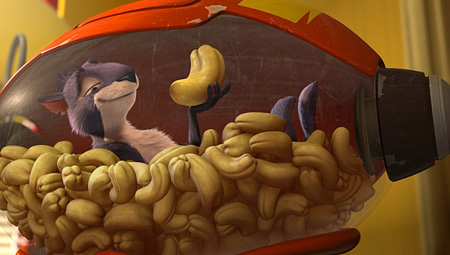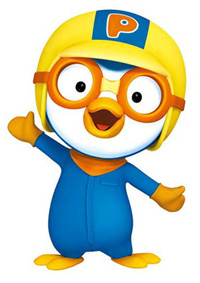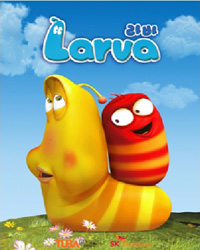- California Assembly OKs highest minimum wage in nation
- S. Korea unveils first graphic cigarette warnings
- US joins with South Korea, Japan in bid to deter North Korea
- LPGA golfer Chun In-gee finally back in action
- S. Korea won’t be top seed in final World Cup qualification round
- US men’s soccer misses 2nd straight Olympics
- US back on track in qualifying with 4-0 win over Guatemala
- High-intensity workout injuries spawn cottage industry
- CDC expands range of Zika mosquitoes into parts of Northeast
- Who knew? ‘The Walking Dead’ is helping families connect
Pororo gives new life to Korean animation
Little penguin turns 10 years old

This is a scene from “The Nut Job,” which will be released in North America on Jan. 17 and in Korea on Jan. 29. (Courtesy of Red Rover)
By Chung Ah-young
When “Pororo, the Little Penguin,” the popular television animation series, was first aired in 2003, few might have expected its remarkable success for a decade, becoming the most beloved children’s cartoon character in the nation.
Pororo has opened a new chapter in Korean animation history in which most Koreans grew up watching Disney or Japanese animation characters such as Mickey Mouse or Astro Boy.
Produced by Iconix Entertainment, the animation has been exported to 120 countries around the world with its total economic effect worth of 5.7 trillion, producing some 1,500 varieties of merchandise from toys to stationery over the last decade, according to the Korea Creative Content Agency (KOCCA).
The Korean animation industry is becoming a goose that lays the golden egg which set a series of successful models in the cultural sector after the sensational little talking penguin.
The Ministry of Culture, Sports and Tourism has recently geared up for boosting the local animation industry by investing in the upcoming film “The Nut Job,” a 3D animated movie jointly produced by Korean company Red Rover and Toronto-based visual effect house Toonbox Entertainment.
The film will be released in over 3,000 theaters in the United States and Canada and will also reach the shores of the United Kingdom in January.
Directed by Peter Lepeniotis, the action comedy is based on his short film “Surly Squirrel” released in 2005, revolving around Surly, a mischievous squirrel, and his friends, who plot to rob a nut store. For the total 45 billion won ($42.79 million) production costs, the state-run Exim Bank of Korea invested 7 billion won, the Industrial Bank of Korea (IBK) invested 1 billion won and the Korea Creative Content Agency, 600 million won.
Canadian actor Will Arnett has been cast as the voice of Surly along with Liam Neeson, Katherine Heigl and Brendan Fraser for the other characters.
To highlight the Korean credit for the animation, the main characters sing and dance to Korean rapper Psy’s “Gangnam Style” in the film.
With The Nut Job, the government has vowed to increase its budget from $16.35 million (17.2 billion won) in 2013 to $21.3 million (22.4 billion won) in 2014 for the animation and character licensing industry.
“Gaining the momentum of widely opening The Nut Job in North America, the ministry will boost the animation as one of the top five cultural content with multilateral support,” said the ministry in a statement. The ministry also said it will diversify the industry through more support on animations for not only preschoolers but also adults. The government plans to actively help animation producers make inroads into new global markets.
Rising on the global scene
A slew of Korean animation productions have been internationally recognized in major film festivals or animation awards, grabbing the attention of the global audience. According to the KOCCA, Korean animation companies exported 150 billion won ($136 million) worth of products in 2011.
“Larva” created by Tuba Entertainment has been nominated for the International Emmy Kids Awards, which will take place in New York, the United States on Feb. 10 next year. The event is an equivalent to the Oscars in the animation sectors.
Previously, “Larva” won the Magnolia award for the category of animation at the 19th Shanghai TV Festival in Shanghai, China in June.
First appearing in 2011 on KBS and cable networks, the popular animation series, which features a pair of slugs ― Red and Yellow ― short, slapstick episodes have become one of the most popular cartoons on television. They have extended the viewers’ range from the current preschoolers to adults.
In its episodes which lasts only a couple of minutes long, two slugs engage in a series of comedic fights, with other creatures such as flies, mosquitoes, dung beetles and snails making cameo appearances. The animation is already shown in 20 countries.
In 2010, “Robocar Poli” won the MIP Junior Licensing Challenge prize, a global showcase for children’s programming annually held in the French city of Cannes. The animation has been shown on leading channels in 50 countries such as France’s Canal Plus, Taiwan’s YoYo TV, Al Jazeera, Russia’s CTC, Japan’s TV Tokyo, Israel’s Nick Jr., and Disney Asia.
Dubbed as “prime minister,” while Pororo is called the “children’s president,” Poli is about a rescue team of transforming robots led by a police car named Poli with his friends, a helicopter named Helly, a fire truck Roy and an ambulance named Amber.
First launched in 2011, the 52 eleven-minute episode cartoon series created by RoiViusal has solidified itself as the second best product in Korean children’s television shows, generating related merchandise including cakes, toys, books and apparel.
After Poli hit the screen on French kid’s channel Piwi Plus, its merchandising products sold out at Toys “R” Us shops in France and became the store’s bestselling product among preschoolers in the first half of 2013.
“The Airport Diary” grabbed the Grand Prix by the Kids Jury at MIP Junior 2012 and began airing in China in late April 2013. After its Korean creator DPS launched a joint venture PDL with its Chinese counterpart Pinggo, it is expected to hit the airwaves on 150 channels in China.


















